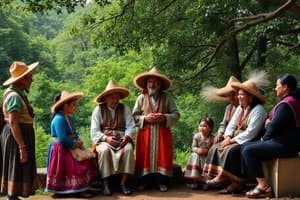Podcast
Questions and Answers
What is the primary method of transmission for folklore?
What is the primary method of transmission for folklore?
- Written communication
- Formal education
- Visual art
- Oral communication (correct)
Who coined the term 'folklore'?
Who coined the term 'folklore'?
William John Thoms
Folklore is typically transmitted through formal educational structures.
Folklore is typically transmitted through formal educational structures.
False (B)
Which of the following is NOT a characteristic of folklore?
Which of the following is NOT a characteristic of folklore?
What is one function of folklore within a society?
What is one function of folklore within a society?
Which of the following is an example of a myth?
Which of the following is an example of a myth?
Folklore reflects the values, norms, and beliefs of the _____ that creates and preserves it.
Folklore reflects the values, norms, and beliefs of the _____ that creates and preserves it.
Folklore remains static and does not change over time.
Folklore remains static and does not change over time.
Flashcards are hidden until you start studying
Study Notes
Folklore Overview
- Folklore consists of stories, customs, and beliefs passed down generationally, primarily through oral traditions.
- Encompasses various creative forms including folk art, songs, myths, and proverbs.
- Serves to educate and preserve cultural heritage of a community.
- Folklorists study folklore creation and its reflection on societal customs and beliefs.
Key Aspects of Folkloristics
- Focus on oral traditions: songs, poems, and oral histories.
- Includes practices/performance: dance, holiday celebrations, and religious customs.
- Involves artifacts: fashion, cuisine, and musical instruments.
Origin of the Term "Folklore"
- Coined by William John Thoms in 1846, replacing terms like "popular antiquities."
- "Folk" denotes people; "lore" signifies shared knowledge or traditions.
Nature of Folklore
- Connected to communal and cultural life, reflecting community values and norms.
- Dynamic and adaptable, evolving over time yet maintaining core cultural identity.
- Typically transmitted orally but can also manifest through customs and rituals.
- Exists outside formal education and often learned through community participation.
- Lacks specific authorship; belongs collectively to the community.
Characteristics of Folklore
- Oral Tradition: Transmitted primarily through spoken word, allowing for fluid retelling.
- Collective Ownership: Created and maintained by the community as a shared heritage.
- Transmission Across Generations: Passed down, with potential modifications to adapt to contemporary contexts.
- Cultural Identity: Plays a pivotal role in preserving and defining community values and beliefs.
- Anonymity: Originates from community consensus rather than individual creators.
- Functionality: Serves educational, entertainment, and ritualistic purposes.
- Adaptability: Evolves to reflect the community's current realities.
- Symbolism: Uses metaphorical language to convey deeper societal meanings.
Examples of Folklore
- Myths: Traditional stories explaining origins and natural phenomena (e.g., Greek mythology).
- Legends: Semi-historical accounts involving heroic figures (e.g., King Arthur).
- Fairy Tales: Fantastical stories featuring magic and adventure (e.g., Cinderella).
- Proverbs: Short sayings conveying wisdom (e.g., "A stitch in time saves nine").
- Folk Songs: Oral traditions reflecting communal experiences and emotions (e.g., "This Land Is Your Land").
- Rituals and Festivals: Ceremonial practices that are integral to cultural identity.
Studying That Suits You
Use AI to generate personalized quizzes and flashcards to suit your learning preferences.




